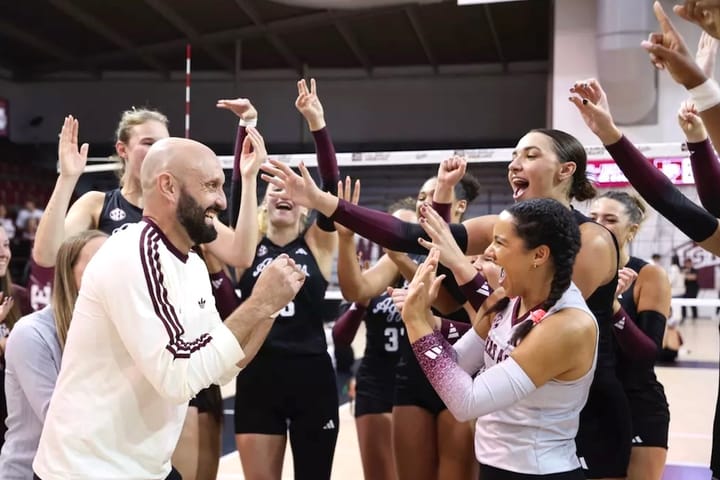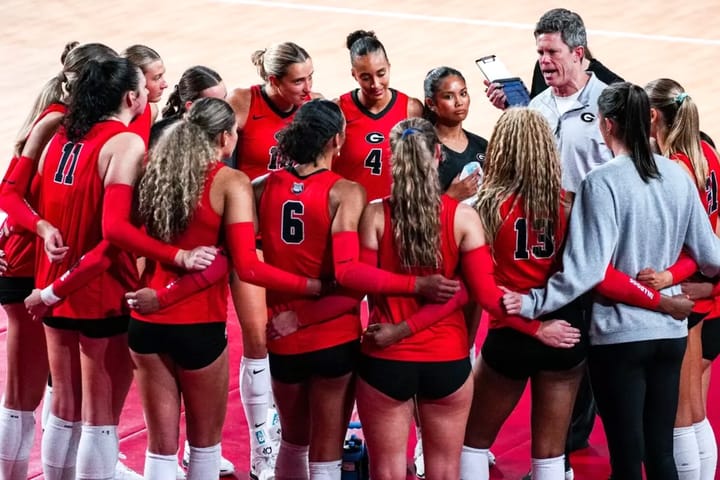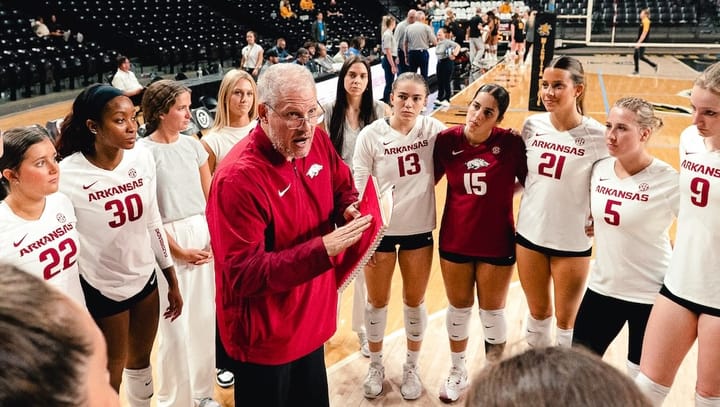58. Jim McLaughlin: The game is the game.
In this Masterclass we feature Jim McLaughlin. Jim earned his spot in the AVCA Hall of Fame in 2021 for his contributions to college volleyball. Coach McLaughlin holds the distinction of being the only coach to win both Division I men's and women's volleyball championships.
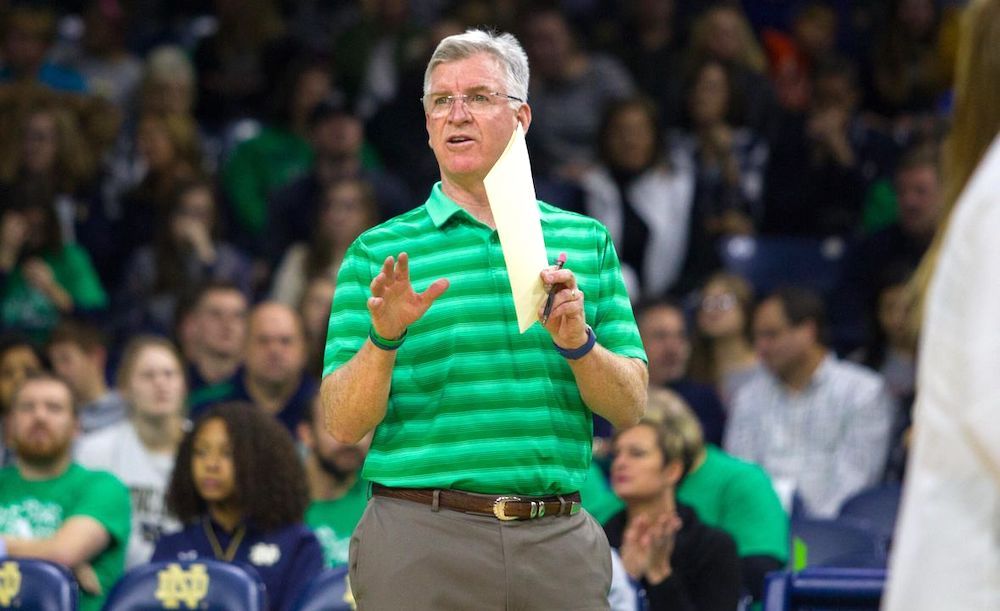
Jim took over the Washington program in 2001, the year before they were last in the Pac-10, and turned them around into a winning program winning the Pac-10 in 2004 and the NCAA Championship in 2005.
In his 13 years at Washington Jim has coached and developed 31 All-Americans, and turned Washington into a national powerhouse.
Even more on coach McLaughlin's career can be found over here.
In this Masterclass Jim talks about:
- How he thinks about learning and transferring knowledge
- The importance of proper beliefs, methods and structure
- Why the World Championship final of 2018 was so important to him
- What he wants to transfer to young coaches
- His insights into player development...
But honestly, this list could go on and on, and even the descriptions above don't even scratch the surface of this in-depth conversation with Jim.
This Masterclass counts 8000+ words and 20 subtitled video clips. Chop it up into a couple of sittings and soak it all up.
Before we get this started a big thanks to coach McLaughlin for his availability.
Enjoy!
Jim, why did you decide to commit to being a volleyball coach? What pushed you towards that decision?
Maybe I got a little lucky. I remember I was finishing up my eligibility as a player at UC Santa Barbara, and I had to finish school.
So my college coach, Kenny Preston, asked me to stay on, be in the gym and help the team. And I loved it. It could feel I loved it. It was something I really enjoyed doing. I felt like I could help. There were a lot of benefits to it.
And then I graduated and I got a job in Hollywood, believe it or not. I was putting sound on motion pictures. It was a good paying job.
But that night, after they called me and said: "Hey, you got the job". I got a call from Rod Wilde and Marv Dunphy. And they said: "Can you come to Pepperdine and help us?" Just for you to know that it would make me barely any money.
I remember I was sitting with my dad and my dad said to me: "Hey, don't close any doors. You're too young. Go check it out."
I always listened to my parents. And I went there. Just in two days, watching practice, looking at the activities, feeling the vibe, the players were good, well, I just thought, wow, it took everything to another level and I thought this is the road I want to travel.
It was that day that I thought, I want to coach forever. I ended up calling the CEO for this film company and I said:" Hey, I'm gonna be a coach". And he wished me well.
So to think back on it. I'm just thankful for volleyball, on too many levels.
It's taken me around the world, all the people I've met. It's been unbelievable.
I can't remember what year it was exactly, maybe it was 1984 or 1985. It is a long time ago.
What advice would you give yourself as a starting coach? An advice that is so clear and logic for you now, but that you had to develop over the years. (Can be about anything)
The advice I'd give, and you gotta be careful giving advice. I remember Carl (Carl McGown) telling me: "Be careful of who you listen to and be careful what you read."
I would give the advice he gave me, and that was to become a better teacher.
You know, Matias, I didn't understand that initially. I didn't even understand what that meant. But I understood it more and more, as I learned more about it.
I kind of acquired this ability as a teacher, and it's an acquired ability for sure. It was the greatest advice that he ever gave me. And I'm most thankful for that advice.
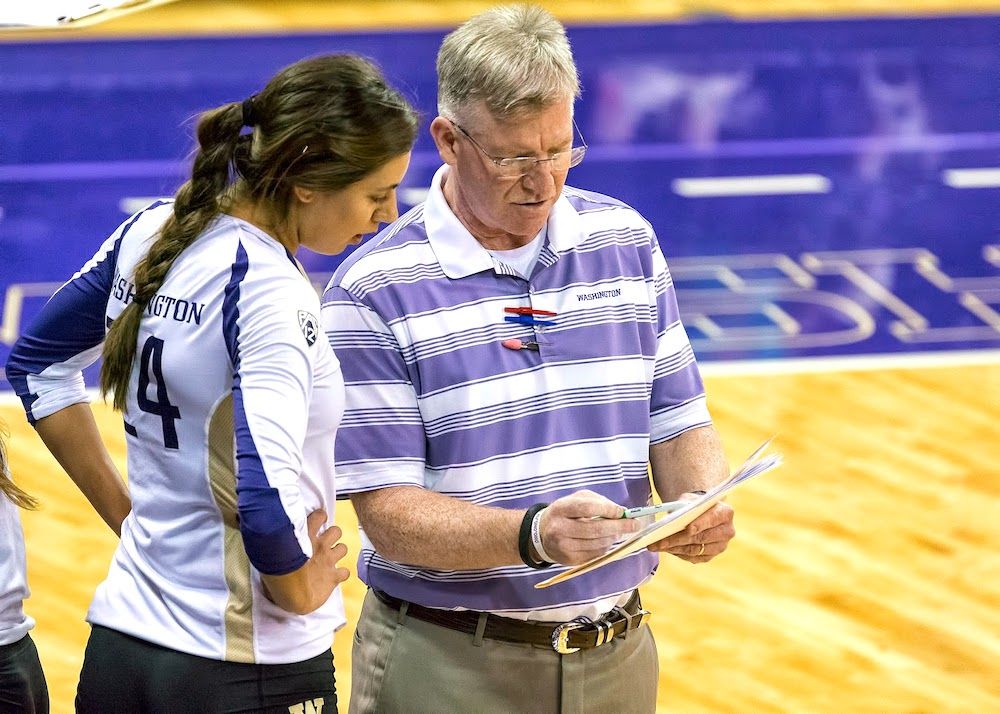
You know, there's so much going on as a coach, and coaching can be divided into many different things.
But teaching for me became the biggest and most important part. And in order to become a better teacher, I had to understand about teaching. I had to understand learning. And I had to acquire this ability.
Now, over time, I started to acquire some knowledge and it was this content stuff, this task side of coaching that was important.
Maybe my education as a coach started through my education as a player, but those things are different. I learned some things and I started getting knowledge and then I just wanted to continue to learn.
But then the key to it was, I had to learn how to apply that knowledge. There's lots of people that know stuff, but that don't know how to do stuff.
I'm helping coaches now, and I'm blown away by their knowledge. But their teams don't do the stuff they're telling me.
So I had to really get into a process. For me, that was really the key to coaching. And then, over the course of a career, you learn how to make better choices and decisions. I really think that separates people.
Because teaching is about a lot of things. To me when my teams played the best, they were making really good choices and decisions in these different situations. Hitting the right shots, who takes this ball, all the different things.
And they were aware, and they were smart.
And I think a coach teaches their players how to do that.
When I was at USC, I coached men and I inherited a really good team. Bob Yoder was the coach before me. He was so good. I was with Marv Dunphy and Rod Wilde, so I copied some stuff. I didn't really understand why, but I was doing some things that they had done and I had good players.
I was placing people. And we had a really high level of success. So then it was that next year or two years down the road where I had all these young recruits and I really struggled. Now I had to develop their foundation, their skill level so they could run all the plays that I wanted to run or that I could run with these older guys.
So that really impacted me. That's when I started asking coaches these questions about teaching and learning. And I learned a lot from Carl. Carl was at BYU when I was at SC. He was recruiting these players that I didn't think were that good. I wasn't recruiting them, but they were becoming national team players in four years.
I took notice. And I could see when we played this team, how much pressure I felt, you know, during the game. His defense and his offense just pressured us.
So I called him and said, Carl, can we sit down and talk? And he became one of my best friends and he became my greatest mentor. Then there was Mike Norman, who I played for.,Those two guys were a lot alike, but they were really different.
What I learned from both of them was. They knew exactly what they wanted to do. They knew how they wanted to do it, and they knew why.
They taught us why it was so important for us to do it that way.
They both had a different philosophy. And they did different things, but their leadership as a coach was really kind of neat.
And then one thing, just a personal thing that I would truly encourage coaches do, and I didn't do a good job of this and I wish I had.
Just to encourage 'em to take more time to enjoy what they're doing. To smell the roses, if you will. I wish I had done a better job of that. We celebrated little successes and motivated people and that was important to me as a teacher.
But we moved on real fast when we accomplished something very good. I was on to the next year if we won the national championship or whatever. I just wish I had enjoyed it more. It's the only thing I would do a little bit different.
Matias: Great answers, Jim. Last week I talked with Velasco, also for VolleyBrains. And I asked the same question to him.
And he told me, the first thing that you have to do, for sure for coaches that were pro's or that have had college careers. You have to kill the player that you have within. That player persona that you have inside. Because otherwise you'll tell your athletes: Yeah, but this is easy. Let me show you. You take the ball and you show them, how it should be done. But it's easy for you.
And the more easy, and then that connects to the teaching, the more easy it is for you, the more obvious it is to you, the more you have to work at it to conceptualize it. To find insights, to explain everything and to know how to make something being felt to your players. The more easy it is to you, the more you have to work at it to be able to teach it. And that was something so obvious to me. And so logical that I was like, yeah, that's a great insight. Not only true in sports, this is about everything you do, for sure.
Well Matias, that guy is brilliant. There are a lot of good coaches, but he's one of the few that are brilliant.
I studied him and I learned a lot. And as I coached more, I started having a greater awareness and understanding what he was about. One thing he said was: to be the coach your players need you to be. And you could write a book on that.
He was amazing. There's so many things about him. He's a special coach. He is like Beal, McGown, Dunphy. Those guys.
Do you have a particular goal? Maybe a goal that you already reached or a goal that is so hard to reach that it gives you daily motivation?
It's a good question. I think I've gone full circle. What I mean by that is, when I started coaching, it was pretty pure in terms of I just wanted to develop people. I wanted to enjoy the improvement process. I wanted people to become more confident. I wanted people to really work harder and give greater effort every day.
I wanted people to become what they wanted to become, not what I wanted them to become. What they wanted to become and help them through that.
But when we started getting a return and we started winning, it became about meeting these expectations with great regularity. And it got so much harder.
It's hard to explain, but as you know, expectations can become unreliable, almost volatile. Now I'm at a point where, you gotta have a balance there where, you gotta have some expectations. Because if you don't, well, you gotta be careful what you ask for.
I'm back to really helping kids improve, helping a volleyball player becoming a better volleyball player. Whether they're young, they're old, they're mature, people can get better. Human potential keeps growing. It's just way more fun now to just sit back and really get into teaching and help people figure it out.
Help them become more aware of themselves, more aware in the moment of learning and all those things.
I'm back to that simple process and when the wins come, yeah, I'm stoked. It's a good thing. We need to win. But I'm not focused on that at all.
What are bad recommendations you hear about coaching or training volleyball?
(Jim was very adamant to answer this question...I had skipped over it for some reason during our call and we came back to it at the end, hence the references to earlier moments in our call)
You brought this up earlier and it was really nice what you said. You talked about structure. And I just want you to think about this. I thought more about this question than any other question. We started out saying, there's a lot of opinions and you gotta be careful of those opinions. We wanna study facts.
So I thought about this. I hear people say all the time, you've gotta play and you've gotta play. And it's true. If you follow motor learning and greater transfer, and the appropriate regulatory stimuli. Yes, we're gonna play. So we have to play. Most of our practices should be about playing. But in order to take your game to another level, there's gotta be some structure.
Because the bigger the game, the fewer the reps. So can we put some people, in some situations where it's a smaller group, we're controlling the environment, we're regulating the feedback, we're still on the court making the same move with the same speed. There's some transfer, but there's also gonna be some return quickly. And they start to understand.
The way the brain works is they now can dial in and be mindful about what their body's doing.
They can be mindful of the situation, they get to repeat it over and over, for 15 or 20 minutes. And then we go to the game. And now their brain works differently.
They start to understand situations, early cues, how to respond, oh, I'm inside against one blocker, what do I do? And I don't worry about what my body's doing. But at some point when you become an expert, it all converges. You know what your body did in this situation. And what it has to do to respond to this situation.
So I heard this thing that Kobe Bryant said before he passed away about how you have to have structure. You just can't play street ball. You've gotta have structure to elevate your game and then plug it in.
It was exactly what I believed. If we're teaching people how to move. And then teaching them how to see. Then we can have some very explicit methods where we map it out and define everything. And go into the implicit where we're kind of guiding them in their mutual discovery.
So it also increases the speed of learning. And it helps them retain and recall at a faster/higher level.
Now, I hear coaches and club coaches say, we don't have much time. So we just have to play. But you can still divide up your minutes in a way that helps accelerate the learning process. I just wanted to say that to you because you brought up structure.
And then the other thing is. The game is the game. We can learn so much by studying the game.
I'm doing a study right now on recycling and I'm learning a lot about the men's and the women's game and how it's a little different right now.
But you gotta study. You just can't make things up. You gotta test these great ideas, these great intuitions. And see if they're valid or if they violate some of your principles. That to me is a big deal. It was my favorite question. It goes deep into the teaching process, defining your methods. Getting better at your methods. Because your methods influence everything you do.
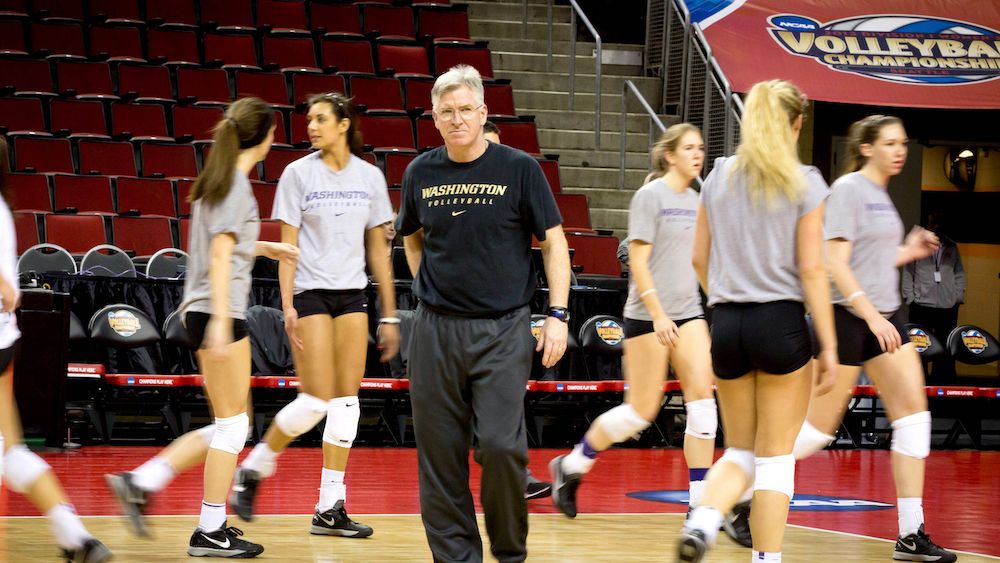
The most important thing as a coach, is to become a coach that believes in their methods. And of course, you gotta do it the way you need to do it. But make sure they are sound methods. And they're supported and defended by some science and some of the things we believe.
But anyways, I could go on and on about that, but you brought it up so I wanted to respond to it.
